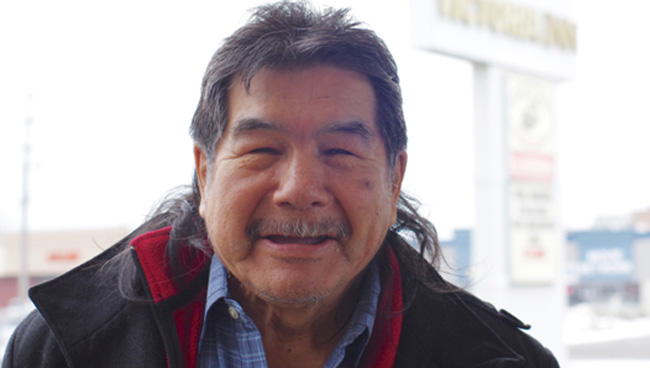Pre-inquiry was an opportunity for family members to have their say

By Rick Garrick
THUNDER BAY – Biigtgong Nishnaabeg (Pic River)’s Michelle Richmond-Saravia spoke about the murder of her great aunt at the Missing and Murdered Indigenous Women and Girls pre-inquiry in Thunder Bay.
“(She) was murdered in the late 1980s and in terms of really ever discussing that experience, I never really had the opportunity to kind of work through that,” says Richmond-Saravia on the second day of the Jan. 5-6 pre-inquiry. “As an educator and a teacher who works primarily with First Nations families and people, I think it is really important that we remember and acknowledge this. We really need to make these spaces to speak about this more.”
Richmond-Saravia says participants are calling for the “grassroots” to lead the upcoming national inquiry to address the high number of missing and murdered Indigenous women and girls.
“They do not want it to be overloaded with politicians speaking on their behalf,” Richmond-Saravia says. “So it really needs to come from the source, from the families.”
Long Lake #58 Chief Allen Towegishig suggested that the upcoming inquiry should include Elders. “Another suggestion I made is the inquiry, they should change that name,” Towegishig says. “Get a different name, an Anishinabe name.”
Towegishig says the pre-inquiry participants appreciated the opportunity to be heard about their murdered or missing family members.
“(For) 15 years, 20 years, 30 years they’ve been gathering around (saying) what can we do,” Towegishig says. “(Now) they finally said somebody is hearing us.”
Red Rock Indian Band’s Tannis Smith says the upcoming inquiry needs to be led by Indigenous people and it “should have a name that comes from the people.”
“But one of the other things that we thought was really important was that the inquiry process go to the fly-in and remote communities,” Smith says. “That there be a panel that goes to each community. I only see a few families here from the north. I think it should have included way more families in this pre-inquiry process.”
The pre-inquiry was held to enable survivors, families and loved ones to provide input into the design of the upcoming national inquiry to address the high number of missing and murdered Indigenous women and girls.
“It is going well — people are getting an opportunity to share part of their story because (those stories) will be reserved for the actual (national) inquiry,” says Georgina Island’s Cynthia Wesley-Esquimaux, who served as the facilitator for the Jan. 6 pre-inquiry meeting with ministers Carolyn Bennett, Indigenous and Northern Affairs Canada, and Patty Hajdu, Status of Women. “Right now we are asking them to focus on what is it you would like to see happen in the inquiry, who should lead it, what kinds of people should be there, who should be the lead spokespeople.”
Wesley-Esquimaux says participants had an opportunity to share their stories on the first day of the pre-inquiry. “They got to share a lot more of the heavier pieces they are carrying,” Wesley-Esquimaux says. “Their voices need to be heard. They have to be able to share their thoughts and feelings on this. Many of them have been carrying this stuff for 30 years or longer.”
Wesley-Esquimaux agrees with the Indigenous naming of the national inquiry.
“The culture has to be there and naming the inquiry I think makes a lot of sense,” Wesley-Esquimaux says. “It makes it distinctive.”
Community members who were not able to attend the pre-inquiry can also use a pre-inquiry online survey to get involved in the process. The online survey is available at: http://www.aadnc-aandc.gc.ca/eng/1448637991710/1448638013197. It was launched on Jan. 5 to enable survivors, family members, loved ones of victims, front-line service providers and others with an opportunity to provide input into who should conduct the inquiry, its timeframe, who should be heard as part of the inquiry process and what issues should be considered.
Bennett says the suggestion to name the inquiry “in an Indigenous way” will be looked at in order to be inclusive of First Nation, Inuit and Metis sisters, noting advice would be welcomed.
Hajdu also noted a suggestion to include the voices of women who have had a near miss in terms of surviving extreme violence in their lives.
Although Indigenous women make up four per cent of the population, 16 per cent of all women murdered in Canada between 1980 and 2012 were Indigenous. Indigenous women are three times more likely to report experiencing violence.
The federal government announced the launch of the national inquiry to address the high number of missing and murdered Indigenous women and girls on Dec. 8. The inquiry was included among the The Truth and Reconciliation Commission’s 94 Calls to Action.


